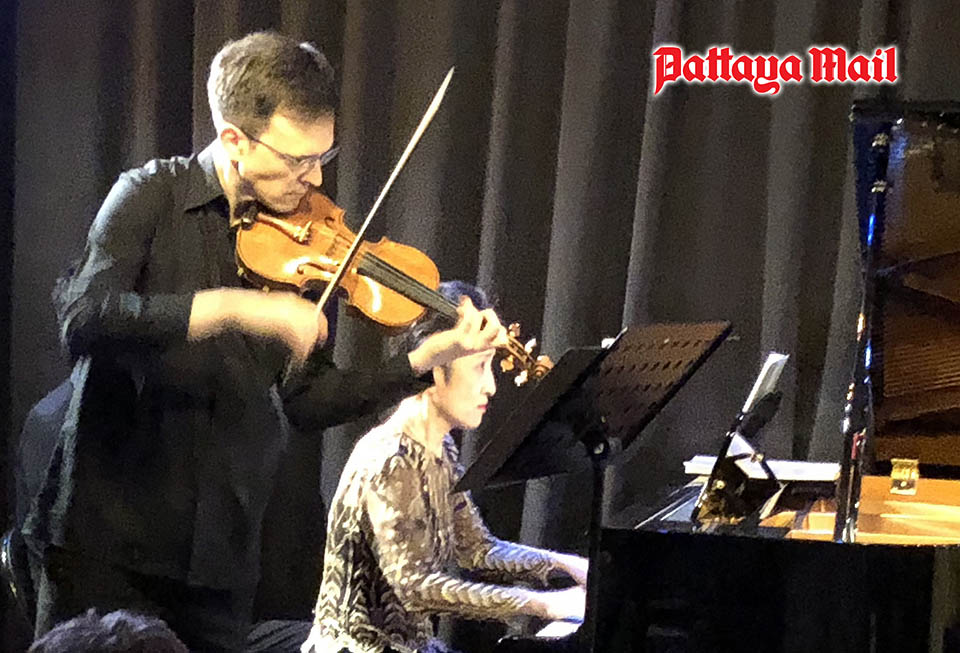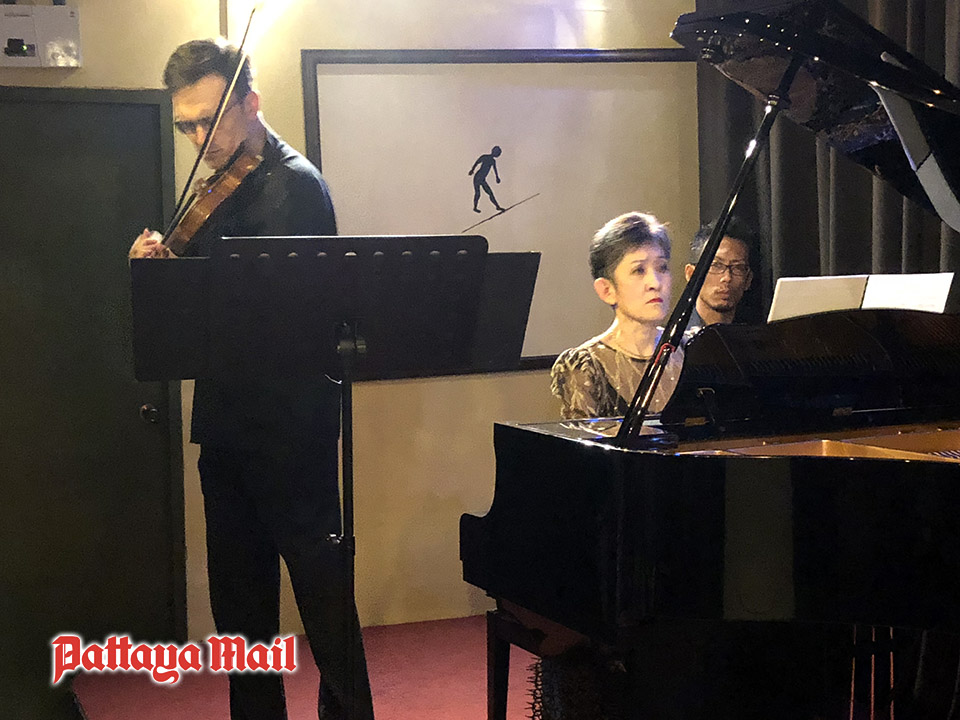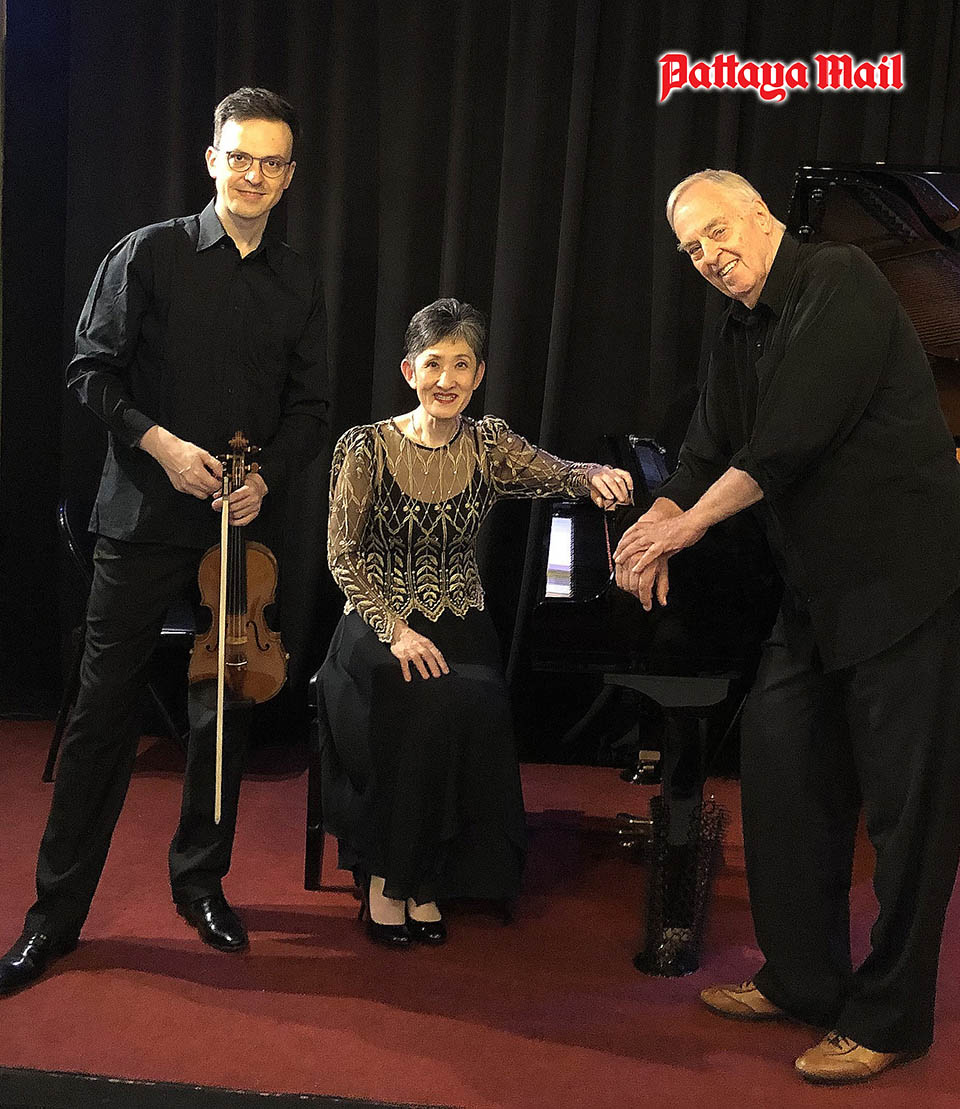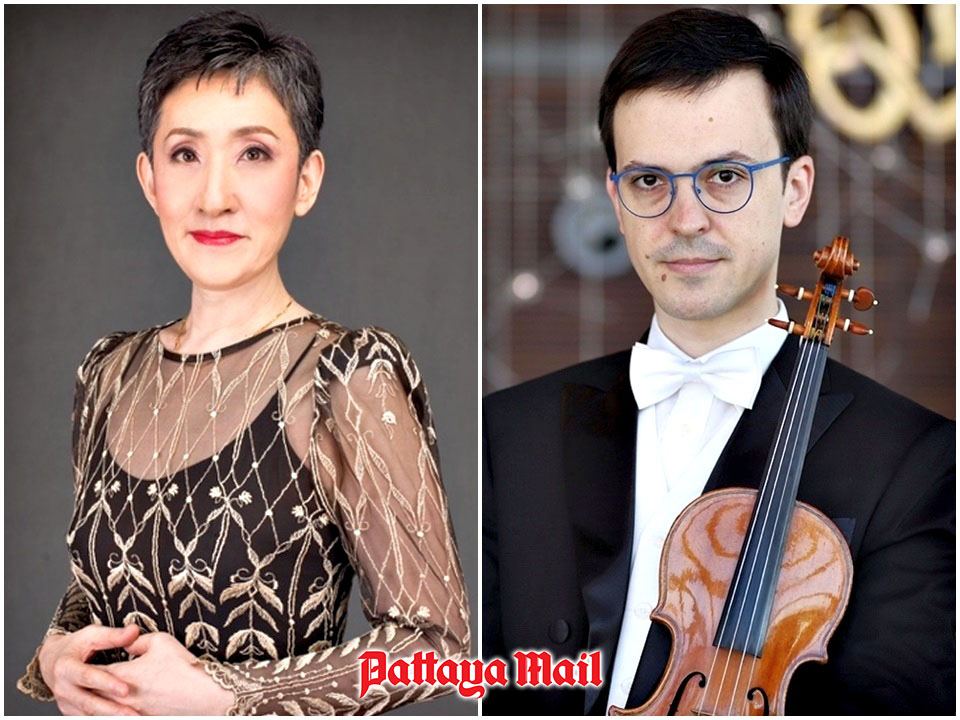
One of the endearing features of Ben’s Theater is that members of the audience invariably show their enthusiasm with hearty cheers if the performance is especially satisfying. There were quite a few well-justified cheers the other night at a concert given by violinist Omiros Yavroumis and pianist Eri Nakagawa. Although they hail from countries far apart (and their names should give you a clue) they are closely involved with both the College of Music of Mahidol University and the renowned Thai Philharmonic Orchestra.
The programme consisted of violin sonatas by Mozart, Beethoven and Schumann. The Mozart and Beethoven share an interesting feature in that they aren’t violin showpieces with piano accompaniment, but rather the opposite: often the piano leads and violin follows. Both were published as “piano sonatas with violin accompaniment” perhaps for commercial reasons. Interestingly, the Mozart sonata was dedicated not to a violinist, but to a pianist who was one of the composer’s students.
Mozart wrote thirty-two sonatas for piano and violin and the first sixteen were written when he was aged between six and ten. Just think about that for a moment. The Violin Sonata No. 24 in F major, K. 376 is a later work, composed in the summer of 1781 when he was twenty-five and living at his new home in Vienna. Mozart was a highly accomplished pianist and violinist and could write for both instruments with consummate ease. The charming first movement is a sparkling, humorous affair, and was given a vigorous performance by Omiros and Eri while in the dreamy and elegant second movement, Omiros’s soft and lyrical violin tone was captivating. The Finale was given a lively and commendable performance and much appreciated by the audience.

Beethoven’s Violin Sonata No 7 in C minor Op 30 is a different kettle of fish. Like the Mozart, the piano dominates musically but there the similarity ends. Gone is the classical elegance of Mozart’s style: this is turbulent, powerful music which marks the start of Beethoven’s so-called “middle period”, in which his music has more weight and forcefulness creating a sense of emotional power. The sonata is the second of a set of three that the composer completed in 1802. The performance by Omiros and Eri was appropriately powerful and aggressive, especially from Eri who really pushed the recently-installed grand piano to its limits. Generally, the sense of ensemble between these two fine two musicians was commendable, though towards the end of the first movement there were moments when the playing was not quite together. I admit that there are technical challenges but the relative positions of the musicians didn’t really help. It seemed to me that eye-contact between them was difficult, if not impossible.
The lyrical and melancholy second movement was beautifully performed, as was the spikey, restless Scherzo which they played with enormous energy and drive. The tumultuous, fiery finale was played with remarkable pace and even a sense of fury, which was most appropriate for this angry, demanding work.
Omiros graduated from London’s Royal Academy of Music with Bachelor’s and Master’s Degrees. He also holds a degree in Musicology from the University of Athens. Since December 2016, he has been the Concertmaster (Leader) of the Thailand Philharmonic Orchestra. He has played with numerous orchestras including the State Orchestra of Athens, the City of Thessaloniki Symphony Orchestra, the City of Athens Symphony Orchestra, the City of Volos Symphony Orchestra and the Metropolitan Symphony Orchestra of Athens.

Eri is from the Japanese city of Osaka and has done a great deal of teaching notably at Indiana’s Ball State University, the University of Northern Colorado and the Western Australian Academy of Performing Arts in Perth. She is among the senior staff at the College of Music at Mahidol University and regularly gives solo recitals as well as concerto performances.
After the interval, Omiros and Eri played Schumann’s Violin Sonata No 1 which the composer wrote during September 1851. The music shares many similarities with the Beethoven sonata, though Schumann pushes the harmonic language much further. Like the Beethoven, this work is full of passion and torment. Even the first movement is marked “With passionate expression” and is dominated by a dark and feverish violin melody and a restless piano part. This work seems to be the music of a troubled mind, for at the time, Schumann was experiencing severe mental issues along with depression.
Omiros and Eri gave a splendid performance of this brooding and profound work. Their reading of the first movement was especially compelling and the musical balance seemed much improved. They brought out the hesitant, playful qualities of the second movement which also served as a showcase for the wonderful warm violin tone that Omiros produces. The last movement has an almost demon-like quality, perhaps unconsciously inspired by the demons that were haunting the composer’s mind at the time. Although there were a few insecure moments, the overall performance of this dramatic music was remarkable and the audience seemed captivated by the brilliance and professionalism of the playing. However, from my position in the room, the piano seemed to dominate throughout the concert, to an extent that sometimes the violin was almost inaudible. But perhaps the balance was better for those members of the audience who were seated closer to the violinist.
The concert concluded with three well-chosen encores providing a pleasing contrast to the Sturm und Drang of the Beethoven and Schumann. The first piece was Mélodie by Tchaikovsky, the final number in the Op 42 set of three pieces for violin and piano written in 1878. Omiros and Eri gave a lively performance of one of the Granados Spanish Dances and the concert concluded with the thrilling performance of Spanish Dance No 1 by Manual de Falla. It was originally a piece in his opera La Vida Breve and provided a fitting and dramatic end to yet another superb concert at Ben’s Theater.







